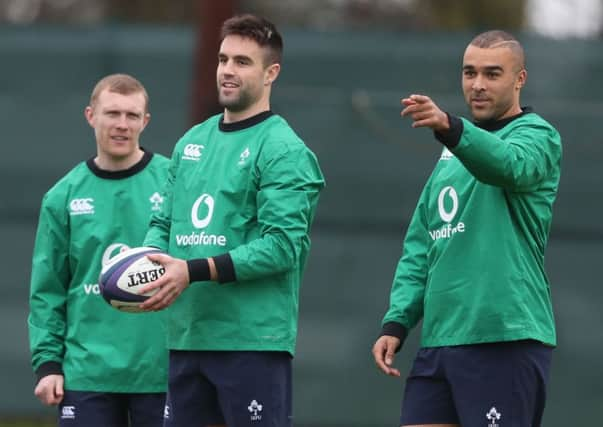Allan Massie: Beware of Irish taking away our feelgood factor


This is one of the years when we have three games at home, which in theory gives us an advantage. Optimism may be curbed by the knowledge that today’s opener is against Ireland who, given their wonderful autumn and the fact that they play England in Dublin, should rightly be favourites for the title. They must know that themselves, and also know that coming unstuck at Murrayfield would put a nasty dent in their ambition.
The players on either side today know each other very well, inside-out if you like. They know their strengths and weaknesses. Most of them have been hammering at each other for years in the Guinness Pro12. In this case, for both teams familiarity is more likely to have bred respect than contempt.
Advertisement
Hide AdAdvertisement
Hide AdIreland have traditionally been quick starters. In the old amateur days they were often on fire for an hour and then faded. Not now. Still, as the All Blacks learned in that famous game in Chicago, Ireland can have a game all but won by half-time. At Murrayfield two years ago they didn’t take that long to have an unassailable lead. So Scotland need to make a good start themselves, as, for instance, they did in the autumn against Australia, and then keep going, as they didn’t quite that day.
Most years even the glass-half-empty ones among us manage to summon up some optimism before the tournament kicks off. There’s more reason to do so this year, to think the glass is at least half-full. The national team’s autumn form, and Glasgow’s European performances, justify that.
But there’s another and perhaps more important reason: this Scotland side is full of players who are still improving. We’ve seen stellar performance from Stuart Hogg, Tommy Seymour, Alex Dunbar, Finn Russell and Jonny Gray, but there’s a lot more to come from them.
Then there are players just beginning their international career – Zander Fagerson, Hamish Watson, Huw Jones and Ali Price – who have immediately looked at ease at this level. Equally important has been the development of players like Ryan Wilson and Tim Swinson, whom a couple of years ago I had mistakenly marked down as “very good club performers, but no more than that”.
Swinson indeed is a case in point. When he moved to Glasgow from Newcastle, his coach there – no less a man than Alan Tait – said he was a terrific worker, but had lousy hands. Look at the way he passes and offloads now, and marvel at the improvement he has made.
There’s experience here too. Some still carp at Greig Laidlaw – “why does he hesitate over the ball? Should move it more quickly” – that sort of thing. But coaches value his calm, unruffled demeanour and his game-management. His critics might ask themselves why he has been recruited for next season by Clermont-Auvergne, the best club in France. Moreover Laidlaw remains a wonderfully reliable goal-kicker, and close-fought international matches are often decided by the quality of the goal-kicking.
There’s one improvement we really must look for. Too often recently a successful kick by Laidlaw has been immediately followed by a Scottish mistake at the restart, and a score at the other end. No team kicks-off more intelligently than Ireland, and no team chases kicks better than Ireland.
They kick a lot, too, and it may well be that the outcome will be determined by Scotland’s ability to deal with Conor Murray’s box-kicking. After Munster’s game against Glasgow, Murray complained that Glasgow players had been “targeting his non-kicking leg”, but there’s nothing in the laws which says you can’t tackle a man in the act of kicking – and it’s surely better to go for his leg than his head.
Advertisement
Hide AdAdvertisement
Hide AdIt was a very strange match when we beat Ireland at Murrayfield in 2013. The Irish dominated the game throughout, enjoying – and wasting – at least 75 per cent of possession and territory. Scotland didn’t reach the Irish 22 until ten minutes into the second half, soon after Craig Gilroy had scored the only try of the game. Paddy Jackson missed the conversion and several other kicks at goal. Greig Laidlaw kicked four penalties. A 12-8 win was gratifying, and the Scottish defensive performance was resolute – though Ireland squandered two or three overlaps. But it wasn’t the sort of victory to spark off a revival. Today’s game should be better, both teams playing with panache.
With Wales and Italy to come to Murrayfield, a win today would put us in line for a successful tournament – even though we do have to go to Twickenham where recurrent Scottish optimism has so often turned to gloom. Still, that’s a treat to come.